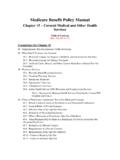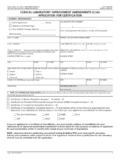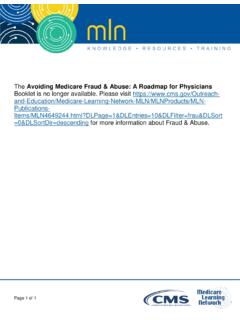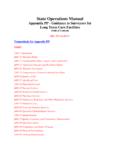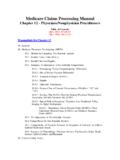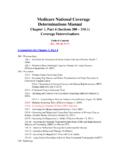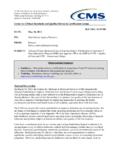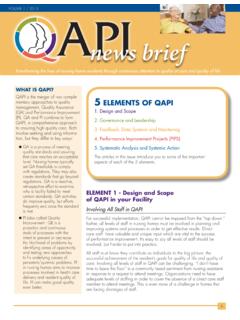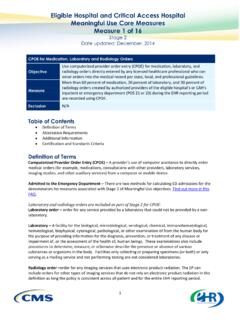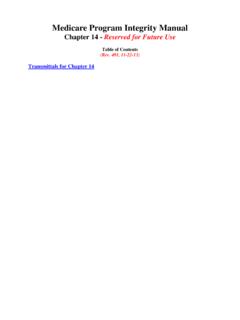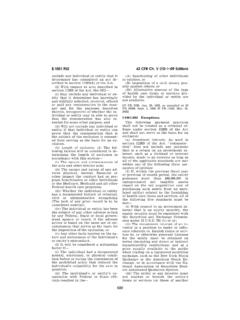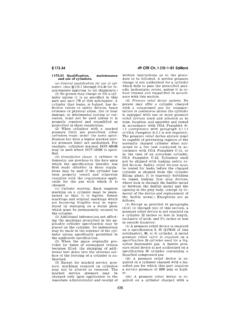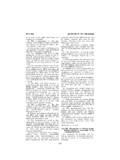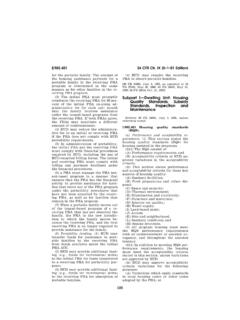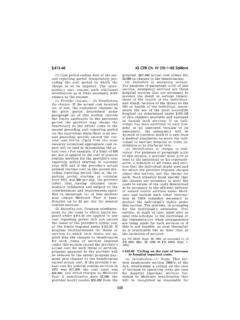Transcription of 410.40 42 CFR Ch. IV (101 02 Edition) - Home - Centers for ...
1 26042 cfr ch . IV (10 1 02 edition ) (d) Condition for coverage of screening prostate-specific antigen blood tests. Medicare Part B pays for a screening prostate-specific antigen blood test if it is ordered by the beneficiary s physi-cian, or by the beneficiary s physician assistant, nurse practitioner, clinical nurse specialist, or certified nurse mid-wife as defined in paragraphs (a)(4) or (a)(5) of this section who is authorized to order this test under State law. (e) Limitation on coverage of screening prostate-specific antigen blood test. (1) Payment may not be made for a screening prostate-specific antigen blood test performed for a man age 50 or younger. (2) For an individual over 50 years of age, payment may be made for a screening prostate-specific antigen blood test only if the man has not had such an examination paid for by Medi-care during the preceding 11 months following the month in which his last Medicare-covered screening prostate-specific antigen blood test was per-formed.
2 [64 FR 59440, Nov. 2, 1999, as amended at 65 FR 19331, Apr. 11, 2000] Coverage of ambulance serv-ices. (a). Basic rules. Medicare Part B cov-ers ambulance services if the following conditions are met: (1) The supplier meets the applicable vehicle, staff, and billing and reporting requirements of and the service meets the medical necessity and origin and destination requirements of para-graphs (d) and (e) of this section. (2) Medicare Part A payment is not made directly or indirectly for the services. (b) Levels of service. Medicare covers the following levels of ambulance serv-ice, which are defined in of this chapter: (1) Basic life support (BLS) (emer-gency and nonemergency). (2) Advanced life support, level 1 (ALS1) (emergency and non-emergency).
3 (3) Advanced life support, level 2 (ALS2). (4) Paramedic ALS intercept (PI). (5) Specialty care transport (SCT). (6) Fixed wing transport (FW). (7) Rotary wing transport (RW). (c) Paramedic ALS intercept services. Paramedic ALS intercept services must meet the following requirements: (1) Be furnished in an area that is designated as a rural area by any law or regulation of the State or that is lo-cated in a rural census tract of a met-ropolitan statistical area (as deter-mined under the most recent Gold-smith Modification). (The Goldsmith Modification is a methodology to iden-tify small towns and rural areas within large metropolitan counties that are isolated from central areas by distance or other features.)
4 (2) Be furnished under contract with one or more volunteer ambulance serv-ices that meet the following condi-tions: (i) Are certified to furnish ambulance services as required under (ii) Furnish services only at the BLS level. (iii) Be prohibited by State law from billing for any service. (3) Be furnished by a paramedic ALS intercept supplier that meets the fol-lowing conditions: (i) Is certified to furnish ALS serv-ices as required in (b)(2). (ii) Bills all the recipients who re-ceive ALS intercept services fro the en-tity, regardless of whether or not those recipients are Medicare beneficiaries. (d) Medical necessity requirements (1) General rule. Medicare covers ambu-lance services, including fixed wing and rotary wing ambulance services, only if they are furnished to a beneficiary whose medical condition is such that other means of transportation are con-traindicated.
5 The beneficiary s condi-tion must require both the ambulance transportation itself and the level of service provided in order for the billed service to be considered medically nec-essary. Nonemergency transportation by ambulance is appropriate if either: the beneficiary is bed-confined, and it is documented that the beneficiary s condition is such that other methods of transportation are contraindicated; or, if his or her medical condition, regard-less of bed confinement, is such that transportation by ambulance is medi-cally required. Thus, bed confinement is not the sole criterion in determining the medical necessity of ambulance transportation. It is one factor that is VerDate 0ct<09>2002 01:11 Oct 24, 2002 Jkt 197170 PO 00000 Frm 00260 Fmt 8010 Sfmt 8010 Y:\SGML\ 197170T261 Centers for Medicare & Medicaid Services, HHS in medical necessity deter-minations.
6 For a beneficiary to be con-sidered bed-confined, the following cri-teria must be met: (i) The beneficiary is unable to get up from bed without assistance. (ii) The beneficiary is unable to am-bulate. (iii) The beneficiary is unable to sit in a chair or wheelchair. (2) Special rule for nonemergency, scheduled, repetitive ambulance services. Medicare covers medically necessary nonemergency, scheduled, repetitive ambulance services if the ambulance provider or supplier, before furnishing the service to the beneficiary, obtains a written order from the beneficiary s attending physician certifying that the medical necessity requirements of paragraph (d)(1) of this section are met. The physician s order must be dated no earlier than 60 days before the date the service is furnished.
7 (3) Special rule for nonemergency ambu-lance services that are either unscheduled or that are scheduled on a nonrepetitive basis. Medicare covers medically nec-essary nonemergency ambulance serv-ices that are either unscheduled or that are scheduled on a nonrepetitive basis under one of the following cir-cumstances: (i) For a resident of a facility who is under the care of a physician if the am-bulance provider or supplier obtains a written order from the beneficiary s at-tending physician, within 48 hours after the transport, certifying that the medical necessity requirements of paragraph (d)(1) of this section are met. (ii) For a beneficiary residing at home or in a facility who is not under the direct care of a physician.
8 A physi-cian certification is not required. (iii) If the ambulance provider or sup-plier is unable to obtain a signed physi-cian certification statement from the beneficiary s attending physician, a signed certification statement must be obtained from either the physician as-sistant (PA), nurse practitioner (NP), clinical nurse specialist (CNS), reg-istered nurse (RN), or discharge plan-ner, who has personal knowledge of the beneficiary s condition at the time the ambulance transport is ordered or the service is furnished. This individual must be employed by the beneficiary s attending physician or by the hospital or facility where the beneficiary is being treated and from which the bene-ficiary is transported.
9 Medicare regula-tions for PAs, NPs, and CNSs apply and all applicable State licensure laws apply; or, (iv) If the ambulance provider or sup-plier is unable to obtain the required certification within 21 calendar days following the date of the service, the ambulance supplier must document its attempts to obtain the requested cer-tification and may then submit the claim. Acceptable documentation in-cludes a signed return receipt from the Postal Service or other similar service that evidences that the ambu-lance supplier attempted to obtain the required signature from the bene-ficiary s attending physician or other individual named in paragraph (d)(3)(iii) of this section. (v) In all cases, the provider or sup-plier must keep appropriate docu-mentation on file and, upon request, present it to the contractor.
10 The pres-ence of the signed certification state-ment or signed return receipt does not alone demonstrate that the ambulance transport was medically necessary. All other program criteria must be met in order for payment to be made. (e) Origin and destination requirements. Medicare covers the following ambu-lance transportation: (1) From any point of origin to the nearest hospital, CAH, or SNF that is capable of furnishing the required level and type of care for the beneficiary s illness or injury. The hospital or CAH must have available the type of physi-cian or physician specialist needed to treat the beneficiary s condition. (2) From a hospital, CAH, or SNF to the beneficiary s home. (3) From a SNF to the nearest sup-plier of medically necessary services not available at the SNF where the beneficiary is a resident, including the return trip.
